Kyriacou to Lead De Nora's BWMS Unit
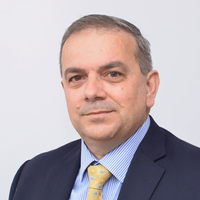
Electrochlorination equipment supplier De Nora announced that Dr. Stelios Kyriacou has been appointed as General Manager of its BALPURE Ballast Water Management System (BWMS) business unit. Dr. Kyriacou joins De Nora Water Technologies from Wärtsilä, where he managed the research, development, design and certification of the full Wärtsilä BWMS range. He previously undertook the same role at Hamworthy from 2009 until its acquisition by Wärtsilä and held roles at Hatlapa Marine Equipment. Dr.
All Ships’ Ballast Water Checked in Great Lakes Seaway
The Great Lakes Ballast Water Working Group (BWWG) released its 2015 Summary of Great Lakes Seaway Ballast Water Management activities Thursday. During 2015, 100 percent of vessels bound for the Great Lakes Seaway from outside the Exclusive Economic Zone received a ballast water management exam. In total, the BWWG assessed all 8,361 ballast tanks on the 455 vessels that transited during the 2015 navigation season. The Great Lakes Seaway Ballast Water Working Group is a binational collection of representatives from the U.S. Coast Guard, the U.S. Saint Lawrence Seaway Development Corporation, Transport Canada - Marine Safety & Security and the Canadian St. Lawrence Seaway Management Corporation.
IMO’s MEPC Set to Adopt Polar Code Provisions
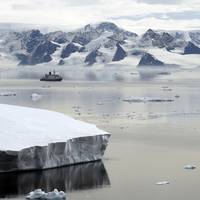
The Marine Environment Protection Committee (MEPC) of the International Maritime Organization (IMO) meets for its 68th session from May 11-15, 2015, at IMO Headquarters in London. Items on the agenda include the proposed adoption of the environmental part of the Polar Code and associated draft MARPOL amendments to make the Code mandatory; the implementation of the Ballast Water Management Convention; further work on air pollution and energy efficiency measures; and a proposal to extend the Great Barrier Reef and Torres Strait Particularly Sensitive Sea Area (PSSA) to parts of the Coral Sea.
Great Lakes Seaway Ballast Water Report Released
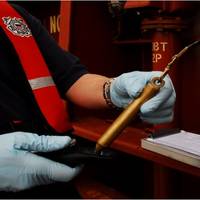
The 2014 Summary of Great Lakes Seaway Ballast Water Management activities was released by the Great Lakes Ballast Water Working Group (BWWG) Thursday. The BWWG aims to harmonize ballast water management efforts between the U.S. Coast Guard, Transport Canada – Marine Safety and Security, the Saint Lawrence Seaway Development Corporation, and the St. Lawrence Seaway Management Corporation. According to the report, 100 percent of ships bound for the Great Lakes via the St. Lawrence Seaway from outside the Exclusive Economic Zone received a ballast tank exam in 2014.
IMO’s MEPC Addresses BWM Convention Issues
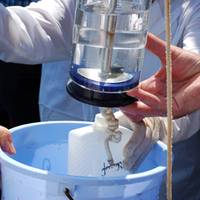
Measures to assist in accelerating the entry into force and implementation of the key international convention designed to eradicate the global spread of harmful organisms in ships’ ballast water were adopted by the Marine Environment Protection Committee (MEPC), of the International Maritime Organization (IMO), when it met for its 67th session (October 13-17, 2014). The International Convention for the Control and Management of Ships' Ballast Water and Sediments, 2004 (the BWM Convention)…
IMO’s MEPC Meets for 66h Session
The Marine Environment Protection Committee (MEPC) of the International Maritime Organization (IMO) meets for its 66th session from 31 March to 4 April 2014, at IMO Headquarters in London. Items on the agenda include the consideration of proposed amendments to the MARPOL to make the audit scheme mandatory; the review of environmental provisions in the draft Polar Code and associated draft amendments to make the Code mandatory, and the implementation of energy-efficiency regulations and the Ballast Water Management and Ship Recycling Conventions. The MEPC will consider, with a view to adoption, draft amendments to MARPOL Annexes I through to VI to make the use of the IMO Instruments Implementation Code (III Code) mandatory.
Bound for the Great Lakes? Ballast Tank Exam a Certainty
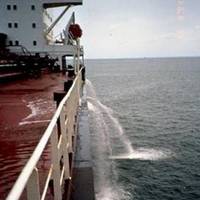
The Great Lakes Seaway Ballast Water Working Group (BWWG) informs of the release of its 2013 Summary of Great Lakes Seaway ballast water management report. The mission of the BWWG is to harmonize ballast water management efforts between: the U. S. Coast Guard, Transport Canada – Marine Safety and Security, the Saint Lawrence Seaway Development Corporation, and the St. Lawrence Seaway Management Corporation. Since 2006, ballast water management requirements in the Great Lakes and the St. Lawrence Seaway System have been the most stringent in the world.
Great Lakes Ballast Water Report Published
The Great Lakes Seaway Ballast Water Working Group announces the release of the 2013 Summary of Great Lakes Seaway ballast water management report. The mission of the BWWG is to harmonize ballast water management efforts between: the U. S. Coast Guard, Transport Canada – Marine Safety and Security, the Saint Lawrence Seaway Development Corporation, and the St. Lawrence Seaway Management Corporation. Since 2006, ballast water management requirements in the Great Lakes and the St. Lawrence Seaway System have been the most stringent in the world. As a result, independent research by Fisheries and Oceans Canada (Science) has indicated that the risk of new aquatic invasive species being introduced into the Great Lakes via ballast water has been mitigated to extremely low levels.
IMO MEPC Implements Further Energy Efficiency
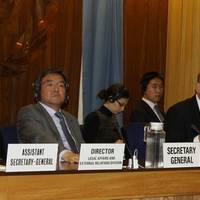
The Marine Environment Protection Committee (MEPC) of the International Maritime Organization (IMO) met for its 65th session from May 13-17 2013, at IMO Headquarters in London. The committee made significant progress in its work on further developing energy-efficiency regulations; adopted an MEPC resolution on rromotion of technical cooperation and transfer of technology relating to the improvement of energy efficiency of ships; and gave the go-ahead to carry out an update to the greenhouse gas (GHG) emissions’ estimate for international shipping.
Wärtsilä BWTS Receives IMO Final Approval
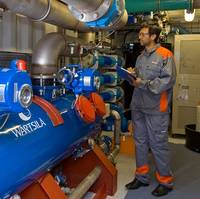
Wärtsilä has received the Final Approval status from the International Maritime Organization's (IMO) Marine Environment Protection Committee (MEPC) for its Wärtsilä Aquarius EC Ballast Water Management System. The approval was granted at the MEPC's 65th session held at the IMO headquarters in London on May 13, 2013. The Basic Approval had been granted in October 2012. The approval submission was taken into consideration as part of the MEPC 65's agenda covering "harmful aquatic organisms in ballast water." Final Approval is required for systems using an active substance…
Ship Energy, BWMS, Recycling on MEPC Agenda
The IMO's Marine Environment Protection Committee (MEPC) meets for its 65th session from 13 to 17 May 2013, at IMO HQ in London. Items on a busy agenda include the implementation of energy-efficiency regulations and the ballast water management and ship-recycling treaties. The MEPC is expected to continue its work on further developing technical and operational measures relating to energy-efficiency measures for ships, following the entry into force, on January 2013, of the new chapter 4 of MARPOL Annex VI, which includes requirements mandating the Energy Efficiency Design Index (EEDI), for new ships, and the Ship Energy Efficiency Management Plan (SEEMP), for all ships.
Great Lakes Seaway Ballast Water Management
The Great Lakes Ballast Water Working Group (BWWG) has released its 2012 Summary of Great Lakes Seaway Ballast Water Management. The mission of the BWWG is to harmonize ballast water management efforts between: the U.S. Coast Guard; Transport Canada; the Saint Lawrence Seaway Development Corporation; and the St. Lawrence Seaway Management Corporation. In 2012, 100% of ships bound for the Great Lakes via the St. Lawrence Seaway from outside the Exclusive Economic Zone received a ballast tank exam. A total of 6,974 ballast tanks were assessed during 386 vessel transits. Vessels that did not exchange their ballast water or flush their ballast tanks were required to either retain the ballast water and residuals on board…
Wartsila's BWMS Granted IMO Basic Approval
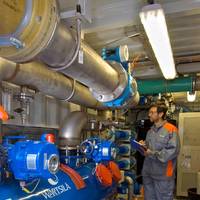
IMO environment committee approves Wärtsilä’s AQUARIUS EC ballast water management system. Wärtsilä’s AQUARIUS EC ballast water management system (BWMS) has been granted BASIC Approval by the International Maritime Organization’s (IMO) Marine Environment Protection Committee (MEPC) during its 64th session in London, which commenced on 1st October 2012. The initial application for BASIC Approval of the AQUARIUS EC system was submitted to the IMO through the Dutch Human Environment…
Ballast Water Inspections Improve, GL/Seaway
A new U.S. government report released March 13 showed a notable increase in the number of ballast tank inspections of oceangoing commercial ships entering the Great Lakes St. Lawrence Seaway System from outside U.S. or Canadian waters. Ship operators also improved their compliance with ballast water requirements in 2008 compared with 2007, the report says. The 2008 Summary of Great Lakes Seaway Ballast Water Working Group released by the U.S. Coast Guard examined the U.S.-Canada Great Lakes Seaway System ballast water ship inspection program. The report finds that 99 percent of all oceangoing ships bound for the Great Lakes Seaway System ports from outside U.S. or Canadian waters in 2008 received a ballast tank exam, compared with 74 percent in 2007.
Oceansaver BWMS Approval
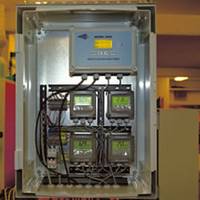
OceanSaver’s ballast water management system was granted final approval from the IMO at the latest meeting of the Marine Environment Protection Committee (MEPC 58) in this month. The Ballast Water Working Group of the Joint Group of Experts on the Scientific Aspects of Marine Environment Protection, which advises the MEPC, had carefully studied OceanSaver's application for final approval in July this year, and recommended that the MEPC grant this approval at its meeting in October.
IMO Releases Agenda for MEPC
The Marine Environment Protection Committee (MEPC) of the International Maritime Organization (IMO) is expected to adopt proposed amendments to the MARPOL Annex VI regulations to reduce harmful emissions from ships, when it meets for its 58th session from October 6-10 at IMO Headquarters in . The Committee will also continue its work on developing a mandatory regime to control greenhouse gas (GHG) emissions from international shipping. The Committee has a packed agenda, which also includes the consideration of the draft ship recycling convention and issues relating to the implementation of the 2004 Ballast Water Management Convention. The draft revised Annex VI to the MARPOL Convention was agreed at the last MEPC session in April.
USCG Releases Great Lakes Ballast Water Management Report
The US Coast Guard released the Great Lakes ballast water management report. The report, compiled by the Great Lakes Ballast Water Working Group (BWWG), summarizes efforts to coordinate bi-national enforcement and compliance efforts to reduce the likelihood of introduction of aquatic invasive species via ballast water. The report indicates that, during 2007, 100% of first trip ships bound for the received a ballast water examination and 100% of ballast water reporting forms were screened to assess ballast water history, compliance, voyage information, and proposed discharge location. Source: HK Law
IMO's MEPC to Meet
The Marine Environment Protection Committee (MEPC) of the International Maritime Organization (IMO) will consider current options to reduce air pollution from ships, when it meets for its 56th session from 9 to 13 July, at the Horticultural Halls, London. Mr. Michel Jarraud, Secretary-General of the World Meteorological Organization (WMO) is scheduled to address the opening session (at 0930 on Monday 9 July) of the Committee, on the invitation of IMO Secretary-General Mr. Efthimios E. Mitropoulos. The Committee has a packed agenda, which also includes the further consideration of options to reduce air pollution from ships; the current draft of a proposed ship recycling convention…
MEPC Progresses on Key Issues
The Marine Environment Protection Committee (MEPC) of the International Maritime Organization (IMO) made progress on a packed agenda when it met for its 56th session from 9 to 13 July in London. Among a series of important decisions, it agreed to commission a study into the impact of proposed measures to reduce air pollution from ships. The Committee also further developed the proposed Ship Recycling Convention, discussed issues relating to the implementation of the 2004 Ballast Water Management Convention and adopted a number of amendments to the MARPOL Convention. Mr. Michel Jarraud, Secretary-General of the World Meteorological Organization (WMO) addressed the opening session of the Committee, at the invitation of IMO Secretary-General Mr. Efthimios E. Mitropoulos.
Ballast Convention Nears Completion
Last week the International Maritime Organization came a step closer in the completion of the long awaited international Convention on the control of Harmful Organisms in Ships' Ballast Water. Intertanko participated at the specially convened meeting of the Ballast Water Working Group where over 180 delegates representing member states and NGOs upheld the IMO's spirit of compromise in discussing and agreeing on some of the main principles of this difficult Convention. The nature of the ballast water problem has meant that new ground has had to be broken by the IMO in taking into account absolute levels of control to ensure effective regulations which would cope with the science of biology - past Conventions have mainly focused on the chemical and physical aspects of marine pollution.





